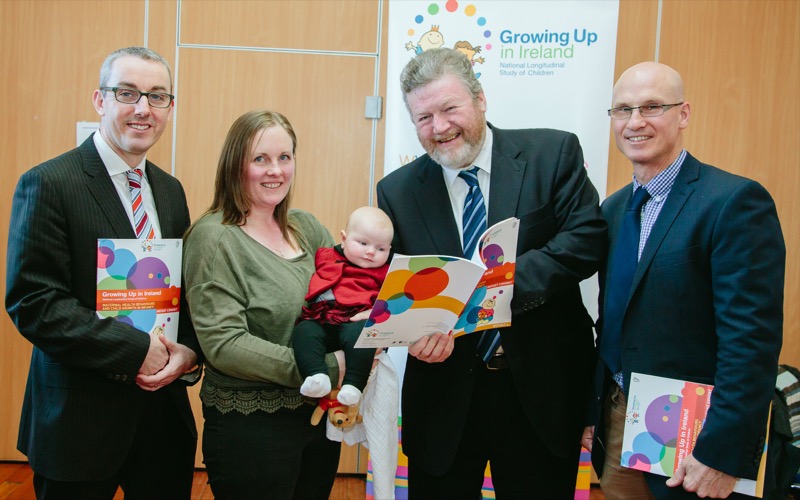Study Identifies Impacts of Women’s Socio-Economic Status on Infant Health
Posted on: 16 January 2015
A new report from the Growing Up in Ireland (GUI) study, led by researchers at Trinity College Dublin, provides evidence of the profound influence of early life environment on children’s subsequent health and identifies implications for policy-makers.
The latest GUI study, which is the largest national study of children ever to take place in Ireland, has identified the longer term negative impacts of three specific maternal health behaviours on patterns of physical and mental health development in childhood. The study, entitled ‘Maternal Health Behaviours and Child Growth In Infancy’, was carried out by Professor Richard Layte, recently appointed Professor of Sociology in the Department of Sociology at Trinity College and Dr Cathal McCrory, Research Fellow, Centre For Medical Gerontology at Trinity College. The report was recently launched by the Minister for Children and Youth Affairs, Dr James Reilly.
Commenting at the launch, the minister said:
This report and its findings are a clear reminder that the prenatal period and the early years of a child’s life provide a unique window of opportunity to establish lifelong health and well-being patterns.
We must do what we can to protect children from harmful exposure to smoking in the prenatal and early childhood period and re-establish breastfeeding as the cultural norm in Ireland, thereby making it the natural choice for parents.

The GUI project is a government-funded study of children which aims to help improve understanding of all aspects of children and their development. The project involves a large nationally representative cohort study (20,000 children in total) and follows the development of two cohorts of Irish children, an Infant Cohort and a Child Cohort. The current findings were based on the Infant Cohort of over 11,000 children (undertaken between September 2008 and April 2009 when the children were 9 months old) and drew on data from the first wave of data collection from the study. The findings contribute to our knowledge of the impacts of prenatal and early-life environment on the subsequent health and well-being of older children.
Among the research findings, the report noted:
- “Almost half of children were weaned onto solid foods before the guideline age of 6 months, although reasons for the early weaning were unclear.”
- “Less breastfeeding and earlier weaning onto solid foods was associated with an unhealthy pattern of weight gain in infancy.”
The report also highlighted:
- “The prevalence of early weaning in Ireland (before 6 months) suggests that parents in Ireland are not aware of the health consequences for their child. This reinforces the need for health professionals to communicate a clearer message on this issue to parents."
Commenting on the policy implications of the findings, Professor Richard Layte said:
Poor child and maternal environment during pregnancy and infancy contributes to early ill health and may have life-long consequences. Research internationally shows that investment in maternity services and community health services saves money both in the short and long run.
The study investigated the extent and distribution of three specific health behaviours among mothers in the GUI study, namely cigarette smoking and alcohol consumption in pregnancy and extent of breast feeding. The researchers then examined the impact of these behaviours on children’s birth weight and subsequent growth and development from birth to 9 months of age. The findings show that maternal smoking and alcohol consumption in pregnancy and the level of breast feeding are strongly influenced by the social environment of the mother and also the mother’s mental health. According to the researchers, the findings have significant implications for child health policy, particularly in terms of the need for improvements in maternity and community health services.
Key findings from the Growing Up In Ireland Study:
- Compared to women in the UK, women in Growing Up in Ireland were significantly less likely to report drinking during pregnancy, but if they did consume, they were likely to drink more heavily than their UK counterparts
- Women with higher levels of income and education were more likely to drink alcohol during pregnancy, but were more likely to drink in moderation
The GUI study followed the progress of almost 20,000 children and their families – a Child Cohort (8,568 children) interviewed at nine years and 13 years of age and an Infant Cohort (11,134 children) participating at nine months, three years and five years of age. Further details of the study can be found at the study website, here.
